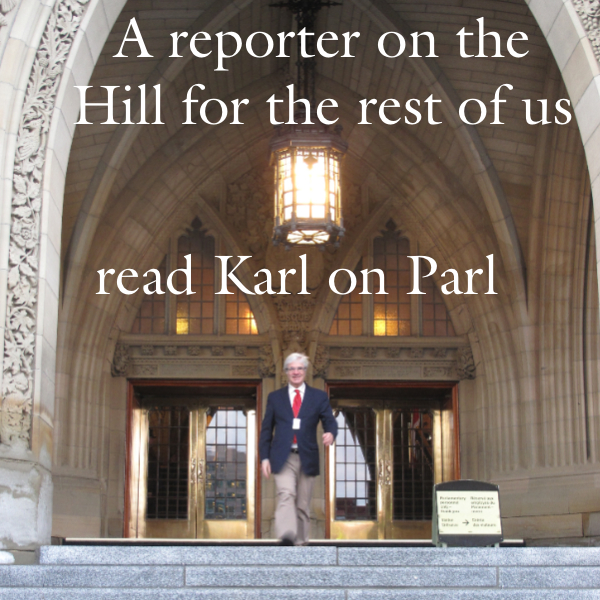Keep Karl on Parl! Donate today to have Parliamentary reporting for the rest of us.
Stephen Harper’s appointments of Mike Duffy and Pamela Wallin to represent Prince Edward Island and Saskatchewan were illegal and unconstitutional from day one.
Here’s why.
The Canadian Constitution stipulates two requirements regarding a Senator’s residency status.
One requirement is that the Senator must own $4,000 worth of property in the province he/she represents.
Another and more basic requirement is that a Senator be a resident in the province he/she represents.
There are a few other requirements, such as minimum age (30), and you can find them all in Article 23 of the British North America Act.
The exact words on residency are: “[A Senator] shall be resident in the Province for which he/she is appointed.”
What was the PM thinking?
When he appointed Wallin and Duffy (and perhaps even Senator Caroline Stewart-Olsen) the Prime Minister knew they were not, in any common sense way, “residents” of Saskatchewan or Prince Edward Island (or, in Stewart-Olsen’s case, New Brunswick).
Stewart-Olsen was, she now says, in the process of moving back from Ottawa (where she served in the Prime Minister’s Office) to New Brunswick when she was appointed. However, she has been quoted as saying that she cannot remember when it was that she officially re-established residency on New Brunswick.
That memory lapse may come back to haunt her and the man who appointed her.
But leaving Stewart-Olsen aside, it boggles the mind to consider that the Prime Minister did not realize when he appointed Duffy and Wallin in 2009 that there was something very wrong with naming two (admittedly prominent) people to represent provinces in which they did not reside.
Before he decided to adopt his recent pose of self-righteous outrage, Stephen Harper used to justify those appointments by referring to the two Senators’ “longstanding associations” with the provinces of their birth.
What Harper seemed to be saying was that, in his view, the meaning of “residency” for Senators was not the same as the common sense, person-in the-the-street’s definition of “residency.”
However, neither Harper nor anyone else has yet specified what those special Senate residency requirements are.
A resident is a resident is a resident…
The black and white words of the Constitution are utterly clear and unambiguous. And there is an old legal principle that when a term in law is not further defined it is to be understood in its normal, common usage way.
If we rely on the generally accepted sense of the word “resident”, it would mean someone who lives, more or less full time, in the province he/she represents, full stop. It would not mean someone who has a cottage or family business in that province, but lives in another province.
This writer has been a lonely voice in pointing out that basic fact since the beginning of the current spending scandal.
All of the subsequent difficulties — for the Senate and for the Prime Minister’s Office (PMO) — flow from that unvarnished fact.
When the issue of improper expenses first came to light, the folks in the Prime Minister’s office — and the Prime Minister himself — dearly wanted to establish that these key Conservative Senatorial appointments were legitimate and legal.
That’s why Nigel Wright (and, we are told, Senator Marjorie LeBreton) told Mike Duffy that for the purposes of his expenses he was officially a “resident” of Prince Edward Island.
They were telling the PEI Senator, in effect, that if their boss believed the former broadcaster was sufficiently a “resident” of P.E.I. to represent that province in the Senate, then he was a resident of that province in every sense of the word — end of story.
Ironically, Duffy now relates that when those same PMO and Senate leadership folks wanted to apply pressure on him they clearly indicated that they knew all along there was something not quite kosher about his being named to the Senate for P.E.I. in the first place.
Their pressure tactic was to threaten to have Duffy declared unqualified to represent P.E.I. in the Senate, precisely because he did not fulfill the residency requirement.
All is fair in love, war and back-room political manipulations, it seems.
The PMO insiders and Conservative Senate leaders somehow did not realize that kicking Duffy out on the residency issue would not look very good for the man who had appointed him.
It would raise the question of why Harper had ever considered naming this residentially-unqualified person to the Upper House.
Natural justice?
Having said all that, one can still believe that the Senate majority’s move to punish Brazeau, Duffy and Wallin is a manifestly unfair — and perhaps also illegal — procedure.
It does not look like an exercise in the administration of justice.
It looks like a vendetta, even a politically-motivated effort to cover up the PMO’s part in the whole mess.
If the majority of members of a legislature can effectively expel members they do not like, on the basis of a majority vote, and nothing else, then our democracy is in trouble.
It sets as terrible precedent.
What will happen if and when the political majority in the Senate tries to expel members because of their political views or affiliations?
Such a frightful occurrence would not be a big leap from the current kangaroo court procedure.
And the bottom line is that however greedy Duffy, Wallin and Brazeau might have been, the person who bears the largest burden of responsibility for this whole mess is Stephen Harper.
Nobody has yet suggested suspending him.



